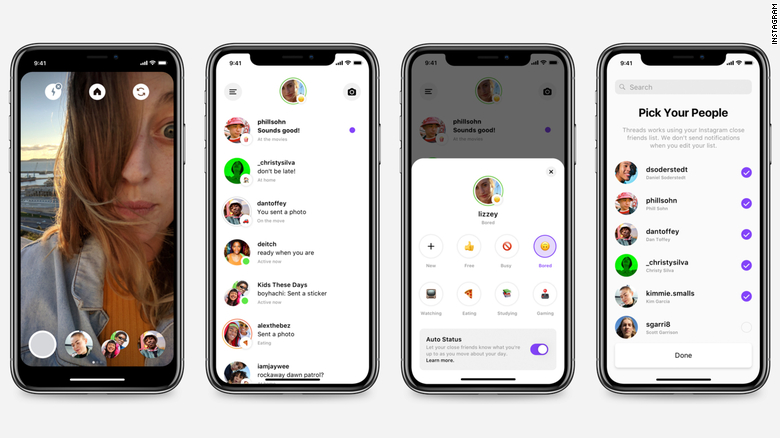 Instagram has infamously copied a number of Snapchat's most popular features, including Stories -- photos and videos that disappear after 24 hours -- and augmented reality filters that overlay selfies with special effects like cat ears and fake eyelashes.
This tactic has paid off for Instagram. Some 500 million people use Instagram Stories every day, compared to Snapchat's entire daily user base of roughly 200 million.
"It definitely isn't the first time Instagram has taken a page out of Snapchat's playbook," said eMarketer analyst Jasmine Enberg. "There are some similarities between Threads and Snapchat."
One similarity she pointed to is the ability to keep tabs on friends' locations. Snapchat offers a map feature that lets users share their exact location with friends. Enberg said Instagram is looking to offer something similar with Threads, but without showing precise coordinates -- perhaps in a nod to broader scrutiny of Facebook's data privacy practices.
The launch comes at a time when Facebook (FB) and other tech giants are facing scrutiny in Washington over their power and influence. The House Judiciary Committee has launched a "top-to-bottom" antitrust probe of big tech firms. Facebook also faces antitrust probes from eight states and the District of Columbia as well as from the Federal Trade Commission. Facebook's competitors, including Snapchat's parent company, have reportedly spoken with investigators from the FTC about the company's aggressive tactics.
For Facebook, however, the introduction of Threads aligns with the companys broader ship to focus more on private messaging and group chats.
Earlier this year, Facebook CEO Mark Zuckerberg outlined a vision for the company that includes an emphasis on private, encrypted and ephemeral messages. However, this pivot could create other problems. It could limit the accountability of Facebook and bad operators on its platforms by making it harder to track and police troubling content. For example, content ranging from fake news to false advertising could get distributed privately rather than publicly.
"People are interested for sure in more private sharing," said Enberg. "Whether or not they want an app from Instagram and from Facebook that does more of this remains a question."
Instagram has infamously copied a number of Snapchat's most popular features, including Stories -- photos and videos that disappear after 24 hours -- and augmented reality filters that overlay selfies with special effects like cat ears and fake eyelashes.
This tactic has paid off for Instagram. Some 500 million people use Instagram Stories every day, compared to Snapchat's entire daily user base of roughly 200 million.
"It definitely isn't the first time Instagram has taken a page out of Snapchat's playbook," said eMarketer analyst Jasmine Enberg. "There are some similarities between Threads and Snapchat."
One similarity she pointed to is the ability to keep tabs on friends' locations. Snapchat offers a map feature that lets users share their exact location with friends. Enberg said Instagram is looking to offer something similar with Threads, but without showing precise coordinates -- perhaps in a nod to broader scrutiny of Facebook's data privacy practices.
The launch comes at a time when Facebook (FB) and other tech giants are facing scrutiny in Washington over their power and influence. The House Judiciary Committee has launched a "top-to-bottom" antitrust probe of big tech firms. Facebook also faces antitrust probes from eight states and the District of Columbia as well as from the Federal Trade Commission. Facebook's competitors, including Snapchat's parent company, have reportedly spoken with investigators from the FTC about the company's aggressive tactics.
For Facebook, however, the introduction of Threads aligns with the companys broader ship to focus more on private messaging and group chats.
Earlier this year, Facebook CEO Mark Zuckerberg outlined a vision for the company that includes an emphasis on private, encrypted and ephemeral messages. However, this pivot could create other problems. It could limit the accountability of Facebook and bad operators on its platforms by making it harder to track and police troubling content. For example, content ranging from fake news to false advertising could get distributed privately rather than publicly.
"People are interested for sure in more private sharing," said Enberg. "Whether or not they want an app from Instagram and from Facebook that does more of this remains a question."
DISCLAIMER: The Views, Comments, Opinions, Contributions and Statements made by Readers and Contributors on this platform do not necessarily represent the views or policy of Multimedia Group Limited.
Latest Stories
-
8th Ghana CEO Summit scheduled for May 27
2 mins -
Leaked intimate video has severely embarrassed me; I’m sorry – Serwaa Amihere
33 mins -
Poll results alone don’t constitute victory for any political party- Asiedu Nketia cautions NDC
2 hours -
Gyakie spills truth on her journey to fame
2 hours -
Energy sector CSOs challenge President Akufo-Addo to transparent value for money audit of SML contract
2 hours -
Plunderers of the State will face the music – Prof Jane Opoku-Agyemang promises
2 hours -
We don’t feel safe after inconsiderate conduct of Regional Minister – Ashanti ECG staff
3 hours -
Ghana needs urgent reset and inspiring leadership – Mahama
4 hours -
Asiedu Nketia cautions NDC: Don’t be complacent, election 2024 victory isn’t assured yet
4 hours -
Ongoing power crisis worst in the 4th Republic- Alhassan Suhuyini
4 hours -
Power challenges would be over in the next few days – Herbert Krapa
5 hours -
Full text: Acceptance speech by Prof Naana Opoku-Agyemang as Mahama’s running mate
5 hours -
Government’s fiscal adjustment on track – Report
5 hours -
Commercial drivers damn threats, unilaterally hike transport fares
5 hours -
Restore dignity to Vice President’s office – Fifi Kwetey to Prof Naana Opoku-Agyemang
5 hours

